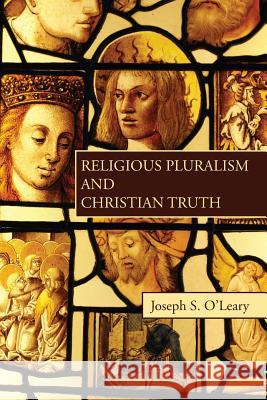Religious Pluralism and Christian Truth » książka
Religious Pluralism and Christian Truth
ISBN-13: 9781498281454 / Angielski / Miękka / 2016 / 284 str.
This is the second of three essays in fundamental theology--along with Questioning Back (1985) and Conventional and Absolute Truth (2015)--which attempt to reassess the status of Christian doctrinal language within the contemporary ""regime of truth."" Reflecting on the reality of religious pluralism as the governing horizon of theology today, it proposes that the very notion of religious truth needs to be rethought. In a dialogue with Derrida it argues that the effects of dissemination and differance have indeed unsettled any project of pinning down truth in a definitive, substantial way, while at the same time it defends the objectivity of concretely situated truth-judgments as more than merely an effect of the play of language. The Buddhist conceptions of emptiness, conventional truth, and skillful means--further explored in Philosophie occidentale et concepts bouddhistes (2011)--allow a positive religious significance to be found in this mutation in the status of Christian truth. ""The Christian faith at present exists in the midst of a Western philosophical critique of truth, meaning and reference in language, and simultaneously in a pluralist society where other faiths may no longer be ignored. Joseph O'Leary addresses both those issues."" --Studies in World Christianity Joseph S. O'Leary is Edward J. Sexton Professor Emeritus of Philosophy at Claremont McKenna College. He has taught at Duquesne University and Notre Dame, has contributed to theological journals in English and French, and is coeditor of Heidegger et la question de Dieu. He is presently doing research in Japan on the relationship of the Kyoto philosophers to the Buddhist tradition.
This is the second of three essays in fundamental theology--along with Questioning Back (1985) and Conventional and Absolute Truth (2015)--which attempt to reassess the status of Christian doctrinal language within the contemporary ""regime of truth."" Reflecting on the reality of religious pluralism as the governing horizon of theology today, it proposes that the very notion of religious truth needs to be rethought. In a dialogue with Derrida it argues that the effects of dissemination and differance have indeed unsettled any project of pinning down truth in a definitive, substantial way, while at the same time it defends the objectivity of concretely situated truth-judgments as more than merely an effect of the play of language. The Buddhist conceptions of emptiness, conventional truth, and skillful means--further explored in Philosophie occidentale et concepts bouddhistes (2011)--allow a positive religious significance to be found in this mutation in the status of Christian truth.""The Christian faith at present exists in the midst of a Western philosophical critique of truth, meaning and reference in language, and simultaneously in a pluralist society where other faiths may no longer be ignored. Joseph OLeary addresses both those issues.""--Studies in World ChristianityJoseph S. OLeary is Edward J. Sexton Professor Emeritus of Philosophy at Claremont McKenna College. He has taught at Duquesne University and Notre Dame, has contributed to theological journals in English and French, and is coeditor of Heidegger et la question de Dieu. He is presently doing research in Japan on the relationship of the Kyoto philosophers to the Buddhist tradition.











